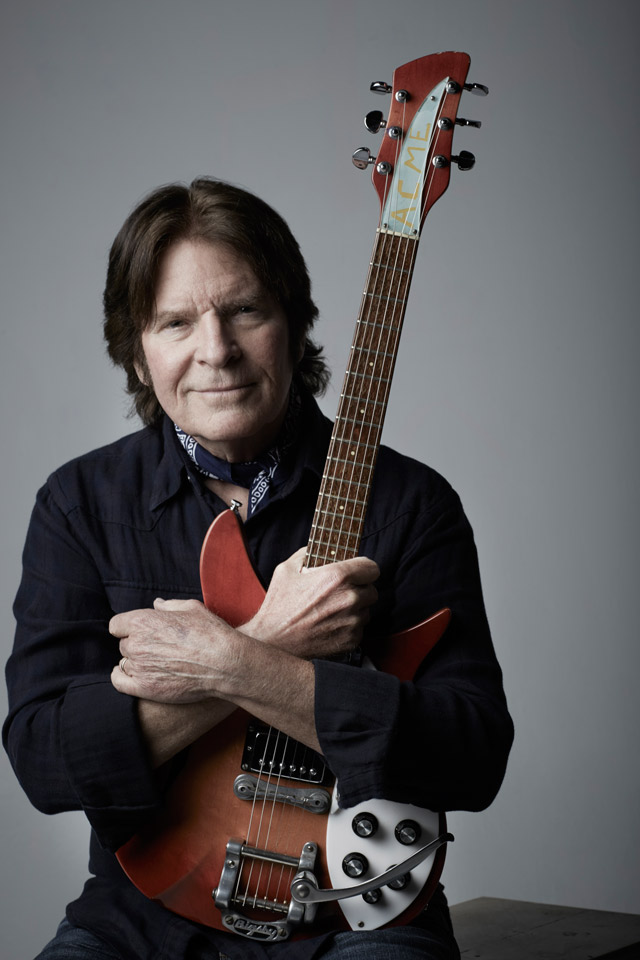John Fogerty is reunited with his CCR Rickenbacker after 44 years

Sometime around 1973 or '74, John Fogerty was at Creedence Clearwater Revival's rehearsal space in San Francisco.
The band had recently broken up, and the successful guitarist/songwriter didn't really know what lay ahead—at least beyond his new album at the time, The Blue Ridge Rangers. Two 12-year-old kids—apparently named Rick and Louie—were hanging out at the rehearsal space, and Fogerty decided to give his 1969 Rickenbacker 325 to Louie.
"I was just detached and numb at that point," Fogerty told Rolling Stone. "I think I gave it away to sort of end that chapter of my life."
The Rick had been his main CCR guitar for several years; he used it for pretty much every standard-tuning song on every Creedence album from 1969's Bayou Country through 1972's Mardi Gras. It's the guitar he played at Woodstock and on The Ed Sullivan Show, the guitar that can be heard on "Green River," "Travelin' Band," "Up Around the Bend" and many more.
The Fireglo (what most other manufacturers and news websites call "sunburst") guitar, which he bought at the Rickenbacker showroom in Los Angeles in '69, had a unique look. Right after Fogerty bought it, he took it to his back yard, grabbed some yellow paint and wrote "ACME" in all caps on the headstock's name plate. Some say he was inspired by the fictional corporation in the Warner Bros. cartoons he loved as a kid.
About 20 years later, Fogerty stumbled upon the guitar at Norman's Rare Guitars in Tarzana, California. However, the store was asking for a lot of money at the time. "I just looked at [Norman] and the guitar, shook my head and said, 'I'm not doing that'," Fogerty said.
Just last year, however, Fogerty casually mentioned to his wife, Julie, that he'd like to get that old ACME guitar back. Without telling him, she poured everything into a search to track it down—a search that led to Gary's Classic Guitars in Loveland, Ohio.
Get The Pick Newsletter
All the latest guitar news, interviews, lessons, reviews, deals and more, direct to your inbox!
Cut to this past Christmas morning. After opening most of the gifts under the tree, Fogerty noticed one more large box that was wrapped in paper but also covered by one of his trademark plaid shirts. Fogerty removed the shirt and wrapping paper and saw—you guessed it—an old Rickenbacker case.
"I was immediately struck dumb," Fogerty said. "I turned to my wife and said, 'Am I about to get overwhelmed here?'" It was his long-lost ACME Rick.
"I never imagined I'd see it again," Fogerty told Rolling Stone. It didn't take him long to plug in the ax for the first time in more than 40 years. "I started playing the solo in 'Green River,' and the hairs stood up on the back of my neck. It was exactly that sound, 100 percent."Fogerty will use the guitar March 3, when he resumes his John Fogerty: Fortunate Son in Concert residency at the Wynn Las Vegas. Stay tuned for a video!


Damian is Editor-in-Chief of Guitar World magazine. In past lives, he was GW’s managing editor and online managing editor. He's written liner notes for major-label releases, including Stevie Ray Vaughan's 'The Complete Epic Recordings Collection' (Sony Legacy) and has interviewed everyone from Yngwie Malmsteen to Kevin Bacon (with a few memorable Eric Clapton chats thrown into the mix). Damian, a former member of Brooklyn's The Gas House Gorillas, was the sole guitarist in Mister Neutron, a trio that toured the U.S. and released three albums. He now plays in two NYC-area bands.
“There’d been three-minute solos, which were just ridiculous – and knackering to play live!” Stoner-doom merchants Sergeant Thunderhoof may have toned down the self-indulgence, but their 10-minute epics still get medieval on your eardrums
“There’s a slight latency in there. You can’t be super-accurate”: Yngwie Malmsteen names the guitar picks that don’t work for shred


![A black-and-white action shot of Sergeant Thunderhoof perform live: [from left] Mark Sayer, Dan Flitcroft, Jim Camp and Josh Gallop](https://cdn.mos.cms.futurecdn.net/am3UhJbsxAE239XRRZ8zC8.jpg)







